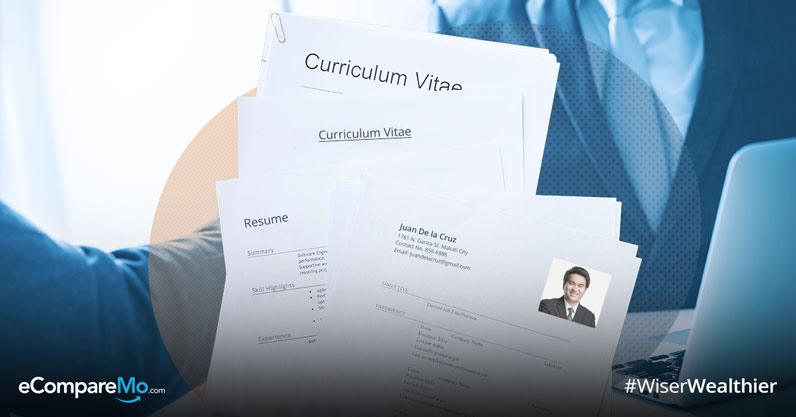Adulting 101: What Is The Difference Between A Resume And A CV?
5 min readA few weeks from now, 2018 will draw to a close and we will enter a brave new year. To many people, this means a fresh start and they face the new year with a hopeful disposition.
One way to take advantage of the fresh

Whether you’re a veteran employee looking for a change in circumstances or a fresh grad about to take your first steps into the job market, a good resume or CV is the best way to get HRs attention.
Resume or curriculum vitae (CV)—what separates one from the other? When do you need one?  Confused? We’ve got you covered.
Paper view bout
The first thing you need to help you stand out from the rest of the hopefuls is a document of your achievements. This means you need a killer resume or CV that will make human resources think twice about dunking your materials in the shredder.
In a nutshell, these are what both documents should contain:
- Basic information
- Contact details
- Educational background
- Professional experience
- Awards and recognitions
- Relevant skills
While they contain almost exactly the same thing, the way these pieces of information are presented wildly differ. From the length of the documents to the way your credentials are organized, each format has its own use. Let’s go over the specifics.
(Read:Â Adulting 101: A Fresh Grad’s Guide To Employee Requirements And IDs)
Resume: the fastest gun in the west
Everyone is familiar with the resume, which is a handy thing to have no matter how steady your current job is. You can find countless resources online about writing better resumes, templates to make yours more attractive, and other tips to make a successful one.
But what exactly is a resume?
In a nutshell, a resume tells an employer everything that makes you employable: education, previous employment, skills, and others. It is a short document that will tell your prospective employers that you’re the perfect candidate for their job.
Although the resume gives people a little bit of everything, the star of the show should be on your professional experience. Since it basically an overview of your professional history, it should be brief and focus on the highlights of your professional life.
Another key attribute of the resume is its flexibility. Since it is basically a living document, it must adapt to the job you want to get. You do not include irrelevant information in your resume, not just to cut out the fluff, but also to give your resume more concentrated firepower.
For rookie job hunters, the resume will contain almost everything they’ve achieved so far to make them stand out from the rest. Meanwhile, experienced candidates should only include the relevant experience to their potential job. In the Philippine job market, the resume is the standard requirement by companies.
The CV: the full-scale attack
If the resume is just a recap of your experiences, then it is the opposite with a curriculum vitae. More commonly known as a CV, this document will be a more detailed summary of your professional history.
In Latin, curriculum vitae means “course of life†so you that should give you an idea what you’re going to build here.
Since the CV exposes a broader side of the applicant, it can run for as long as you can let it be. For your average applicants, one document is at least two to three pages. Meanwhile, veteran applicants especially those have achieved quite a feat may require more than ten pages to illustrate their stellar careers.
Although the previous experience is also the highlight of the CV, it must present a broader background of the person. When you write your CV, you have present in great detail your work experience, achievements projects handled, awards, published papers, professional affiliations, and so much more.
The format also matters when writing a CV. Since it details all the intellectual muscle you can flex, it should show the readers how your progress has been.
The document also doesn’t change according to the job—and the only time you amend your CV is when you’ve accomplished something new. Got
Most of the time, HR people demand a CV for job postings that require postgraduate studies. Apart from their work experience, people who have a master’s degree or doctorate are successfully published individuals who can boast of their research materials.
(Read:Â Fresh Grads, These Are The Highest-Paying Jobs In The Philippines Right Now)
Summary glance
To recap, here are the key differences between the two documents:
- Length – a resume must remain as concise as possible while a CV can run up to as many pages as it can depending on the content.
- Content – a resume must only contain background information relevant to the job while a CV must list down everything related to the person’s professional, academic, and extracurricular life.
- Format – a resume can change depending on the way the owner wants to present his background while a CV must follow a chronological listing of its entries.
- Purpose – a resume must be catchy enough to take you to the interview level while a CV must present all your details and background information to the reader.
Regardless of the occasion, it pays to be prepared by having both a CV and resume in your arsenal. Who knows? Maybe the new year will be the time that the opportunity for your dream job will fall on your lap.
Sources: The Balance Careers, Columbia – Career Education, The Undercover Recruiter
